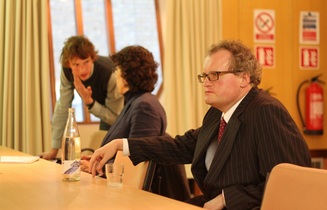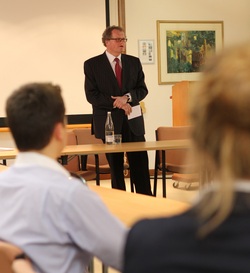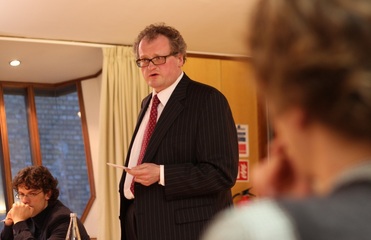By Kamile Vaupsaite

According to Donskis, memories are not homogenous. Sometimes they do overlap, but more often they are irreconcilable. How does one remember the establishment of the Independent State of Croatia in 1941-1945? Does one rejoice at it, seeing it as an achievement, or does one bow one's head in shame for the creation of a puppet state under the Nazi regime? The ambivalence of the twentieth-century history, the totalitarian past, made the countries both victims and perpetrators, stated Donskis.

Donskis emphasized that memories are not always dissonant. They sing in unison when culture and arts are remembered. 'Muss es sein? Es muss sein,' quoted Donskis, recalling the closing movement of Beethoven’s String Quartet No. 16. Music, together with other artistic fields, has no political boundaries to impede the workings of memory.
Politics should be scraped off the memory like the mud from walking boots. It should not interfere with the process of remembering. According to Donskis, memories deal with the past and the past should be left to historians.
I remember (if my memory does not mislead me) how in my school years I have scribbled down the fact that Mussolini cut down on the number of history textbooks from 334 to only one, approved by the fascist regime. Mussolini did so to impose his memory on others. He wanted to reduce history – in Lithuanian we call it istorija – from a collection of stories – istorijos – to a single story – istorija. The ambiguity between history and story in the Lithuanian language – both are called istorija, – reflects how easy it is to pass from one to the other, from plurality to singularity.
Donskis's talk abounded with memorable literary allusions. Among many others, the professor mentioned Primo Levi, an Italian Jew who survived the Auschwitz. Mentioned, but did not quote him. Literary memory is what helps the narrator in If this is a man keep his dignity. When Primo Levi returned from the concentration camp, the compulsion to ensure that everyone remembered what had happened was so strong that from a chemist he became a writer. Memories burnt within me, wrote Levi.
Apart from writing, he went and told his story orally – like a modern Ancient Mariner reciting his tale to everybody on the street.
Levi acted on the basis of his memories and his actions are a clear illustration of the double nature of remembering. It is both a thought and a deed, observed Donskis. To remember is to have continuity, to remember is to be human, to remember is to care.
Yet memory also kills, Donskis warned us. In order to survive we have to know how to forget. Tamina's suicide in The Book of Laughter and Forgetting, Levi's and Pavese's in the non-fictional world – they remind us that to be able to hold onto life one has to learn to let go. Fixation, as Dante discovers through his journey to the underworld, is characteristic of Hell.

The importance of memory was already understood by the Greeks: truth (alēthea) is what is not forgotten (lethe). The lecture given by prof. Leonidas Donskis was memorable, and, to some of us, even unforgettable. Oxford Lithuanian Society would like to thank the professor for that which is not forgotten.
 RSS Feed
RSS Feed